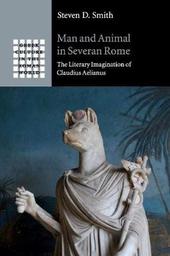
|
Man and Animal in Severan Rome: The Literary Imagination of Claudius Aelianus
Paperback / softback
Main Details
| Title |
Man and Animal in Severan Rome: The Literary Imagination of Claudius Aelianus
|
| Authors and Contributors |
By (author) Steven D. Smith
|
| Series | Greek Culture in the Roman World |
|---|
| Physical Properties |
| Format:Paperback / softback | | Pages:320 | | Dimensions(mm): Height 230,Width 152 |
|
| Category/Genre | Literary studies - classical, early and medieval |
|---|
| ISBN/Barcode |
9781108401937
|
| Classifications | Dewey:937.07 |
|---|
| Audience | | Professional & Vocational | |
|---|
| Illustrations |
Worked examples or Exercises; 11 Halftones, unspecified; 11 Halftones, black and white
|
|
Publishing Details |
| Publisher |
Cambridge University Press
|
| Imprint |
Cambridge University Press
|
| Publication Date |
6 April 2017 |
| Publication Country |
United Kingdom
|
Description
The Roman sophist Claudius Aelianus, born in Praeneste in the late second century CE, spent his career cultivating a Greek literary persona. Aelian was a highly regarded writer during his own lifetime, and his literary compilations would be influential for a thousand years and more in the Roman world. This book argues that the De natura animalium, a miscellaneous treasury of animal lore and Aelian's greatest work, is a sophisticated literary critique of Severan Rome. Aelian's fascination with animals reflects the cultural issues of his day: philosophy, religion, the exoticism of Egypt and India, sex, gender, and imperial politics. This study also considers how Aelian's interests in the De natura animalium are echoed in his other works, the Rustic Letters and the Varia Historia. Himself a prominent figure of mainstream Roman Hellenism, Aelian refined his literary aesthetic to produce a reading of nature that is both moral and provocative.
Author Biography
Steven D. Smith is Associate Professor of Classics and Comparative Literature at Hofstra University, New York. He is the author of Greek Identity and the Athenian Past in Chariton: The Romance of Empire (2007).
Reviews'Smith compellingly argues that Aelian discusses the desire of animals to provide a moral commentary on human society ... [T]hose interested in Roman Hellenism and the intellectual world of Severan Rome will welcome [this] book.' M. L. Goldman, Choice 'Smith gives us a compelling, incisive and thought-provoking tour of Aelian's thought. Smith's Aelian is well worth knowing.' Tom Hawkins, Histos 'Man and Animal in Severan Rome is an exciting and imaginative study ...' C. W. Marshall, Bryn Mawr Classical Review 'The social and political implications of animal representations rightfully play a paramount role in all of Smith's book. A rich multilingual bibliography is used to throw new light on Aelian's masterpiece and the sophistic culture of the Severan period.' Fabio Tutrone, American Journal of Philology 'This is a welcome study of a neglected author. Recent editions and translations have made Aelian's works considerably more accessible, but there have been still have few specialized studies devoted to him. Smith offers the first monograph-length study of Aelian in English, and the first in any language to include coverage of his three extant works: On the Nature of Animals, Varied History, and Rustic Letters. Smith's book therefore fulfills a long-standing need for a thorough treatment of Aelian, and for a reconsideration of his work in light of new approaches to Imperial Greek literature.' Jared Secord, The Classical Journal 'In this sophisticated book Aelian comes across as a hero with a universalizing literary project who combines an emphatic gaze on animals with a critical gaze on human culture and morality. Smith demonstrates deep insight into the age of this author, who has frequently been underestimated, not least, perhaps, because his topic is animals. Smith makes a convincing case for reading De natura animalium as a critique of Severan Rome, and he opens the reader's eyes to its ambiguities and anxieties in a fascinating way. The book is recommended for all who are interested in Roman culture and history, and especially those who study Roman literature and the literary imagination, as well as to students of ancient conceptions and uses of animals. I think they will enjoy it.' Ingvild Saelid Gilhus, Classical World
|